Address any questions or comments regarding this newsletter to the individual authors listed after each article or to its editors, Nathan Johanning, 618-939-3434, njohann@illinois.edu or Bronwyn Aly 618-695-6060, baly@illinois.edu. The Illinois Fruit and Vegetable News is available on the web at: http://ipm.illinois.edu/ifvn/. To receive or be removed from email notification of new postings of this newsletter, contact Nathan Johanning or Bronwyn Aly at the phone numbers or email addresses above.
In This Issue:
News & Announcements ((FSPCA Preventive Controls for Human Food Training, Updated List of Upcoming Meetings in Missouri for Specialty Crop Growers))
Regional Reports ((St. Louis metro east, Dixon Springs))
Fruit and Vegetable Pest Management ((Warm Winter Weather Sets the Stage for Corn Flea Beetles and Stewart’s Wilt, Modified Growing Degree Days from Jan 1 through March 3, Identifying time periods for protecting clusters from grape berry moths (GBM) with insecticide sprays, Growing New Roots Vegetable Grafting Webinar Series))
Upcoming Programs
Check the Illinois SARE calendar for a full list of programs and links for registration.
http://illinoissare.org/ and http://illinoissare.org/calendar.php
Also see the University of Illinois Extension Local Food Systems and Small Farms Team’s website at:
http://web.extension.illinois.edu/smallfarm/ and the calendar of events at http://web.extension.illinois.edu/units/calendar.cfm?UnitID=629.
- 2019 Small Farms Winter Webinar Series, Thursdays at noon, from January 24 –April 4, 2019.
Registration is open for the 2019 series with a whole new set of topics! It’s easy (and FREE!) to register for the Small Farms Winter Webinars. Sign up for as many as you want at https://go.aces.illinois.edu/SmallFarmWinterWebinar. We’ll send you a webinar reminder, log-on instructions, and how to access the archived recording. If you do not have broadband internet capable of streaming video, call your local Extension office to see if they can offer live viewing.
Topics for this year’s series are:
Mar. 7 Healthy Soil Produces Healthy Vegetables- James Theuri, University of Illinois Extension Local Food Systems and Small Farms Educator
Mar. 14 The Best Practices for Maintaining Healthy Bee Hives
- Doug Gucker, University of Illinois Extension Local Food Systems and Small Farms Educator
Mar. 21 Reducing Damage to Livestock and Specialty Crops from Wildlife
- Dave Shiley, University of Illinois Extension Local Food Systems and Small Farms Educator
Mar. 28 Agroforestry for Diversification on Small Scale Farms
- Bill Davison, University of Illinois Extension Local Food Systems and Small Farms Educator
Apr. 4 ABCs of Tomato Production
- Bronwyn Aly, University of Illinois Extension Local Food Systems and Small Farms Educator
- Severe Storm Seminar, Saturday, March 16, 2019, Jackson County Extension Office, 402 Ava Road, Murphysboro, IL 62966. Extension educator and weather instructor Duane Friend will talk about types of thunderstorms, how lightning forms, tornadoes and current research, and will touch on how weather extremes are predicted to change over time. He will also answer any questions participants have on weather related issues. Registration is online: go.illinois.edu/severeweather2019. Please call Maggie Ray at 618-687-1727 for more information.
- Produce Safety Alliance Grower Training, April 12, 2019, University of Illinois Extension Office, 818 S. Park, Hardin, IL 62047. Do you have concerns about safety in your produce operation? Are you concerned whether you need to comply with the Food Safety Modernization Act Produce Rule? Do you want to know more about the difference between FSMA and GAPs? Then the Produce Safety Alliance Grower Training might be for you! For more information or to register (by April 1): https://go.illinois.edu/PSAHardin2019 The PSA Grower Training Course is one way to satisfy the FSMA Produce Safety Rule requirement outlined in § 112.22(c) that requires ‘At least one supervisor or responsible party for your farm must have successfully completed food safety training at least equivalent to that received under standardized curriculum recognized as adequate by the Food and Drug Administration.’ In addition to learning about produce safety best practices, key parts of the FSMA Produce Safety Rule requirements are outlined within each module. There will be time for questions and discussion, so participants should come prepared to share their experiences and produce safety questions. Costs ($75.00) include PSA Grower Training Manuals, handouts, AFDO Certificate of Course Attendance, and lunch. Certificates are required for individuals looking to meet the conditions of the FSMA Produce Rule. Questions can be directed to Laurie George at (618) 242-0780 or at ljgeorge@illinois.edu.
News & Announcements
FSPCA Preventive Controls for Human Food Training
Are you interested in learning about the Food and Drug Administration (FDA) requirements to become a preventive controls qualified individual? Did you know that these positions are critical to the success of food processing facilities throughout the United States? Through this workshop, participants will learn how to create a Food Safety Plan, how to meet FDA guidelines as required by the Food Safety Modernization Act (FSMA), how to conduct a hazard analysis of the business, how to set up monitoring programs, and what is needed to implement corrective actions when deviations occur.
The Current Good Manufacturing Practice, Hazard Analysis, and Risk Based Preventive Controls for Human Food FDA regulation is intended to ensure safe manufacturing/processing, packing and holding of food products for human consumption in the United States. The regulation requires that certain activities must be completed by a “preventive controls qualified individual” who has “successfully completed training in the development and application of risk‐based preventive controls.” This course, developed by the FSPCA, is the “standardized curriculum” recognized by FDA. To complete the course, a participant must be present for the entire workshop and participate in the exercises.
Upon completion of this 20-hour (2.5 day) course, the trainee will become a FDA-recognized "Preventive Controls Qualified Individual" (PCQI). The course will cover:
- How to create a Food Safety Plan, meeting the FDA requirements as required by the Food Safety Modernization Act (FSMA)
- How to conduct a Hazard Analysis, and differentiate between prerequisite programs and risk-based preventive controls
- Guidelines for choosing Critical Limits, setting up monitoring programs, and implementing corrective actions when deviations occur
- Documentation for all aspects of the PCHF-required Food Safety Plan, including verification and validation activities, monitoring, corrective actions, and records review
REGISTRATION DEADLINE: Friday, March 29, 2019. Register early as space is limited. For more information, contact Ruplal Choudhary at (618) 203-6473 or choudhry@siu.edu.
Registration for this workshop can be found at: https://web.extension.illinois.edu/registration/?RegistrationID=19886
COST: $500.00 per person. Price includes Human foods Handbook, participant workbook, certificate from the Prevent Controls Alliance and the Association of Food & Drug Officials, and food.
DATES/TIMES OF THE WORKSHOP:
Monday, April 1, 2019 8:30am - 5pm
Tuesday, April 2, 2019 8:30am - 5pm
Wednesday, April 3, 2018 8:30am - 12pm
INSTRUCTORS: This course is being taught by FSPCA Lead Instructor Dr. Ruplal Choudhary, Professor, Food Engineering, Southern Illinois University, Carbondale , IL 62901
LOCATION:
University of Illinois Extension Office
4618 Broadway
Mt. Vernon, Illinois 62864
ACCOMMODATIONS:
Overnight accommodations should be scheduled by attendee. Please make arrangements early by calling the hotels directly.
Popular hotels in area are:
Drury Inn & Suites - Mt. Vernon (618) 2465-5201
DoubleTree by Hilton - Mt. Vernon (618) 244-7100
Holiday Inn Express and Suites - Mt. Vernon (618) 242-6710
Fairfield Inn & Suites by Marriott - Mt. Vernon (618) 244-2300
Hampton Inn - Mt. Vernon (618) 244-2323
Comfort Suites - Mt. Vernon (618) 244-2700
Days Inn - Mt. Vernon (618) 241-0160
Super 8 by Wyndham - Mt. Vernon (618) 241-0363
SPONSORS:
Southern Illinois University, University of Illinois Extension
Updated List of Upcoming Meetings in Missouri for Specialty Crop Growers
Here is an updated list of schools, conferences, workshops, and field days from University of Missouri Extension. Some events were posted in the January issue (25-1) and all dates have now been secured. For information on any of these meetings, please contact: Patrick Byers, Commercial Horticulture Field Specialist, Webster County MU Extension 417-859-2044 byerspl@missouri.edu
Bringing Back the American Small Farm Conference
March 19-20, 2019
West Plains Civic Center, West Plains
http://www.americansmallfarm.com/agenda
Missouri Garlic School
May 17, 2017
Springfield Botanical Center, Springfield
Missouri Tomato School
May 30-31, 2019
Lincoln University Carver Farm and local farms, Jefferson City
http://www.webbcityfarmersmarket.com/grower-training.html
Riverhills Elderberry Conference
June 13-15, 2019
Lincoln University Carver Farm and local farms, Jefferson City
https://www.riverhillsharvest.com/comprehensive-elderberry-workshop-s
Pawpaw Field Day
September 20, 2019
MU Southwest Research Center, Mount Vernon
Workshops and Field Days
Blackberry Workshops
- Versailles, April 3, 2019
- Kirksville, April 5, 2019
- Kansas City, June 25, 2019
- Mount Vernon, July 9, 2019
Hops Field Day
August 6, 2019
Bradford Research Farm, Columbia
High Tunnel Workshops
Ripley County, June 6, 2019
Apple Grafting Workshops
- Springfield, March 22, 2019
- Versailles, April 3, 2019
- Kirksville, April 5, 2019
Fruit Production and Pruning
- Oregon County, March 12, 2019
- Texas County, March 23, 2019
USDA 2501 Farmer/Veterans Project Workshops
All workshops are at SCG Headquarters, 1471 N. Benton, Springfield, MO
All workshops run from 1:00-3:00pm
https://www.facebook.com/SpringfieldCommunityGardens/
Feb 16 Natural Farming Practices
A garden or farm that produces healthy, abundant harvests of vegetables and fruit is most resilient when based on natural farming practices. Today’s class will focus on the building blocks of natural farming – nurturing a healthy soil, choosing fruit and vegetable types and cultivars that are best adapted to southwest Missouri, optimizing the resources available in the farm/garden, and organic and biological pest management.
March 9 Good Agricultural Practices and Food Safety
GAPS and Food safety are a series of small steps that lead to an important goal – produce that is safe for us to eat. Today’s class will discuss the farming practices that impact produce food safety – the health and hygiene of the people who work in the garden or on the farm, the safe use of soil amendments, managing animals to reduce risk, using water safely, and sanitation during production/harvest/handling of fruits and vegetables.
April 13 Growing Fruit for Home or Farm
Fruits of all types are a particular favorite in the home garden, and offer income potential for farms. Today’s class will focus on sustainable production of tree and small fruits – apple, pear, stone fruit, grape, bramble, blueberry, strawberry, and a host of minor fruits. Choosing a good site, choosing cultivars, growing, and managing pests are the focus topics.
May 18 High Tunnels, Low Tunnels, Row Covers
Strategies for protected culture offer huge potential for farmers to manage risk. Early and late season extension, year round production, environmental modification, and alternative pest management strategies are all possible with high tunnels, low tunnels, and other protective structures.
June 8 Selling Your Harvest at Farmers Market
A farmers market is an excellent entry point for new farmers. Simply put, the market provides the venue and promotion, and the farmer provides the crop. This workshop will focus on planning for farmers market, developing an effective market presence, promotion and sales strategies, and will include a tour of the C-Street Farmers Market.
July 27 Certified Naturally Grown on Your Farm
As an alternative to certified organic production, the Certified Naturally Grown (CNG) program offers a roadmap to sustainable farming. The CNG certification focuses on farming practices – soil management, pest/weed management, protection of pollinator/beneficial habitat, conserving water and other resources – as they impact sustainability and profitability. Today’s class will describe the process, and include a mock farm inspection.
Regional Reports
From St Louis Metro East... The St Louis Metro East like much of the country is experiencing bitter cold temperatures with the addition of snow covered fields. The recent cold snap delivered lows from 4-12°F and highs in the low 20s. Just prior to the snowfall on March 3rd, some signs of field prep had begun but are on hold again. As of March 5thth, soil temperature at 4” (bare soil) was at 30.4. Soil temperature 4” below sod was at 33.3⁰ F.
Tips on dormant horticultural oil sprays
Although Horticultural Oil can be applied anytime during the dormant season, delay your application until later in the dormant period for better effectiveness. Keep in mind that actively growing and respiring scale and mites are more susceptible than dormant ones, meaning they are more vulnerable to Horticultural Oil when applied as a delayed dormant spray in late winter when temperatures have warmed as opposed to an application earlier in the season when they may still be dormant due to the cold. Use sufficient water to thoroughly drench all surfaces, infiltrating hiding places under shaggy bark, and other cracks and crevices. Although a delayed dormant application should avoid this problem, growers are still advised to spray Horticultural oil when the temperature is above 40°F and when freezing will not occur before the spray can dry.
Two basic petroleum oils are labelled as Horticultural Oils: superior oil and the summer horticultural oil (which includes ultra-fine oil). Superior oil should only be used during the dormant period, and will cause serious damage to green tissue if applied after bud break. Summer horticultural oil is more highly refined and less likely to cause phytotoxicity to plants. It can be used both as a dormant application and during the growing season through a change in rate. Ultra-fine oil is even more highly refined, making it safer to apply at summer rates even when temperatures climb into the 80’s, assuming humidity is less than 65 percent (fast drying conditions).
Elizabeth Wahle (618-344-4230; wahle@illinois.edu)
From Dixon Springs Ag Center…Well, can’t say that the weather has been much better at DSAC compared to the rest of the region. The cold snap of the last few days arrived without snow cover but many of the low lying fields along the river bottoms are totally submerged due to flooding from all of the rain events over the past few weeks. I believe Pope County received around 10” of rain in Februrary, well above the 2” average for the month. Daylength is increasing and so are the signs of spring with a predicted warm up coming later this week/weekend. Seedlings have and continue to be germinating in the greenhouse and most of our tomato and pepper varieties have been transplanted. We are engaging area 4-H and FFA youth this spring by working on a couple of different projects. We are donating greenhouse space while providing seeding/transplanting/management lessons to the local 4-H federation youth for a plant sale fundraiser they have planned this spring. We will also be hosting the local FFA section horticulture judging contest later this month. This will be a great opportunity for the youth to see the types of high tunnel production systems we have operating at DSAC.
We are working with the Extension Forester, Chris Evans, and Kevin Rohling to establish a perennial pollinator planting in an area across from the high tunnels at DSAC. Yesterday we conducted a small controlled burn in the area that will be seeded on Thursday, March 7, 2019. This area probably won’t look very pretty for the next couple of years but it should fill in with mulitple pollinators flowering throughout spring, summer, and fall.
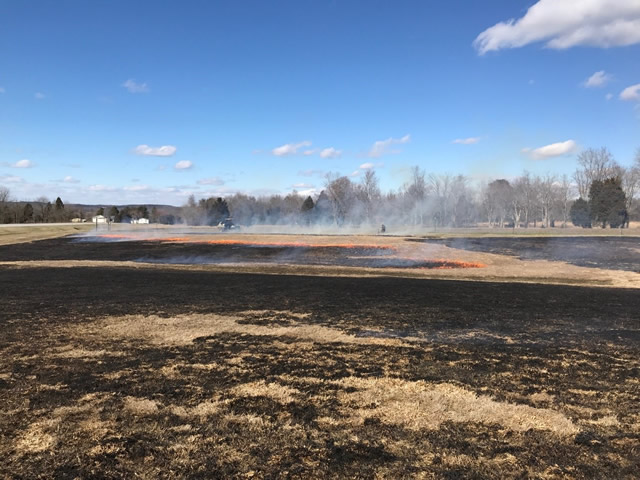
Photo by B. Aly. Controlled burn ahead of seeding in the establishment of a perennial pollinator planting at DSAC.
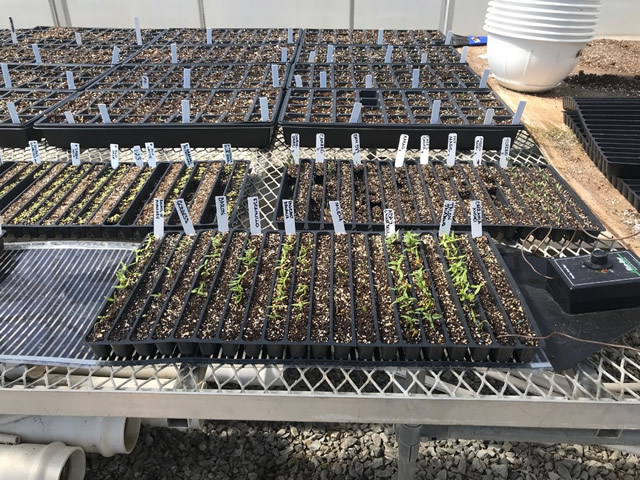
Pepper varieties in seedling tray on heating mat have germinated and are ready to be transplanted. Utilizing some type of constant heat source to maintain optimum germinating temperatures gets seedling off to a quicker, healthier start. Photo by B. Aly.
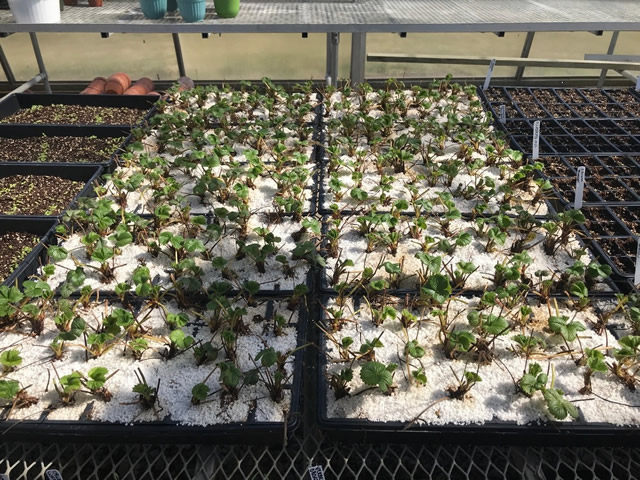
‘Monterey’ strawberry arrived as bare root plants about two weeks ago. They will be transferred to vertical stacks in the hydroponic tunnel next week (March 11th) as temperatures should stay above freezing and the risk of the fertilizer injectors rupturing is past. Photo by B. Aly.
Bronwyn Aly (618-382-2662; baly@illinois.edu)
Fruit and Vegetable Pest Management
Warm Winter Weather Sets the Stage for Corn Flea Beetles and Stewart’s Wilt
With another winter with record breaking temperatures, average winter temperatures in Illinois vary similar to those of the 2017-2018 winter (Figure 1). Cold temperatures during the months of December, January and February favor increased mortality of the corn flea beetle and subsequently, the early season prevalence of Stewart’s Wilt.
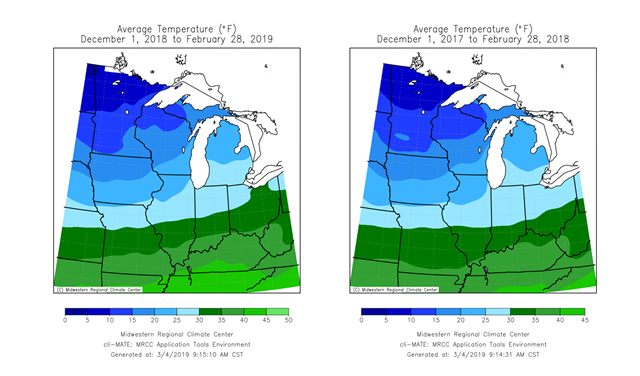
Figure 1. Average winter temperatures of 2018-2019 and 2017-2018.
Corn flea beetles are the primary vector of Stewart’s Wilt. Erwinia stewartii, the bacterium that causes Stewart’s wilt, survives the winter in the gut of the corn flea beetle and the survival of the corn flea beetle is dependent on winter temperatures. Warmer winters result in greater survivorship of corn flea beetles, thus increasing the potential for Stewart’s wilt, while colder temperatures adversely affect it. Using the average temperatures of December, January, and February, the potential for Stewart’s wilt can be predicted (Table 1).
Table 1. Projected risk of Stewart’s wilt based on the average temperatures of December, January, and February.
Average temperature of December, January, & February |
Probability of early season wilt |
Probability of late season blight |
<27° F |
Absent |
Trace, at most |
27-30° F |
Light |
Light to Moderate |
30-33° F |
Moderate |
Moderate to Severe |
>33° F |
Severe |
Severe |
Corn flea beetles become active in the spring when temperatures rise above 65°F, and they feed on and transmit Stewart’s wilt bacteria to seedling corn plants. The bacterium can spread systemically throughout the plant. Although most commercial field corn hybrids are resistant to Stewart’s wilt, the disease is still a concern for susceptible seed corn inbreds and many sweet corn hybrids.
There are two phases of Stewart’s wilt: the seedling wilt phase and the leaf blight phase. The seedling wilt stage occurs when seedlings become infected at or before the V5 stage. The vascular system becomes plugged with bacteria, causing the seedling to wilt, become stunted, and die. Infections of older corn plants usually result in the development of the leaf blight phase of Stewart’s wilt. This phase is characterized by long, yellow to chlorotic streaks with wavy margins along the leaves. When the late infection phase or “leaf blight phase” of Stewart’s wilt occurs after tasseling, it is generally not a concern in sweet corn because ears are harvested before damage occurs.
Based on the recent winter temperatures from the Midwest Regional Climate Center, estimates of early season Stewart’s wilt are shown in Table 2. Remember, however, that these are only predictions; numbers of surviving corn flea beetles are not known.
Table 2. Early season Stewart’s wilt predictions, 2019
Location |
Average temperature December 2018-February 2019 |
Early Season Wilt |
Freeport |
22° F |
Absent |
DeKalb |
23° F |
Absent |
Monmouth |
26° F |
Absent |
Peoria |
28° F |
Light |
Champaign |
29° F |
Light |
Springfield |
30° F |
Light/Moderate |
Newton |
34° F |
Severe |
Belleville |
37° F |
Severe |
Mt. Vernon |
34° F |
Severe |
Carbondale |
37° F |
Severe |
Dixon Springs |
39° F |
Severe |
Kelly Estes (217-333-1005; kcook8@illinois.edu)
Modified Growing Degree Days (Base 50⁰ F, January 1 through March 3)
Station Location |
Actual Total |
Historical Average |
One- Week Projection |
Two-Week Projection |
Freeport |
0 |
4 |
4 |
10 |
St. Charles |
1 |
6 |
5 |
11 |
DeKalb |
1 |
6 |
5 |
12 |
Stelle |
2 |
12 |
7 |
16 |
Peoria |
6 |
17 |
13 |
24 |
Monmouth |
3 |
14 |
9 |
18 |
Champaign |
8 |
19 |
14 |
26 |
Springfield |
15 |
23 |
22 |
37 |
Perry |
14 |
30 |
23 |
38 |
Brownstown |
21 |
41 |
32 |
49 |
Olney |
24 |
41 |
34 |
50 |
Belleville |
34 |
54 |
45 |
64 |
Rend Lake |
34 |
56 |
47 |
66 |
Carbondale |
47 |
61 |
60 |
80 |
Dixon Springs |
64 |
74 |
79 |
100 |
Insect development is temperature dependent. We can use degree days to help predict insect emergence and activity. Degree day accumulations calculated using the Pest Degree-Day Calculator
Kelly Estes (217-333-1005; kcook8@illinois.edu)
Identifying time periods for protecting clusters from grape berry moths (GBM) with insecticide sprays.
Dr. Donn T. Johnson, Fruit Research/Extension Entomologist, University of Arkansas
My suggestion is slightly more labor intensive than just calendar sprays, because GBM damage periods (time to protect clusters with sprays) for each of three generations of GBM vary widely from year to year.
Start weekly scouting in late May for damage after grape berries reach pea-size berry, > ¼” diameter, and continue until a week before harvest (note PHI=pre-harvest interval for formulation).
Inspect 100 to 300 clusters by checking 10 clusters on each of 10 to 30 vines (takes 30 min.) in perimeter vines adjacent to woods (site where GBM overwinter). Turn each cluster in hand looking for the first new GBM larval entry wounds.

New GBM larval hole and tunneling in berries - small hole with slight purple coloration (like veraison but only small spot by hole on berry)
- 1st generation – check clusters for new GBM damage in vineyard perimeter adjacent to woods (GBM overwinter there), also check a couple rows to interior to be sure damage is only in perimeter row.
- Most of 1st generation GBM damage clusters mostly in perimeter vines adjacent to woods from late-May to mid-June = spray perimeter vines if possible
- 2nd and 3rd generations - check clusters for new GBM damage along vineyard perimeter and also a few rows into interior
- GBM berry damage occurs throughout the vineyard from late-June to mid-July for 2nd gen. and from late-July through August for 3rd generations = insecticide treatment to full vineyard
*Assume 3 generations in southern Illinois vineyards at similar latitude as vineyards in Missouri (Graph below).
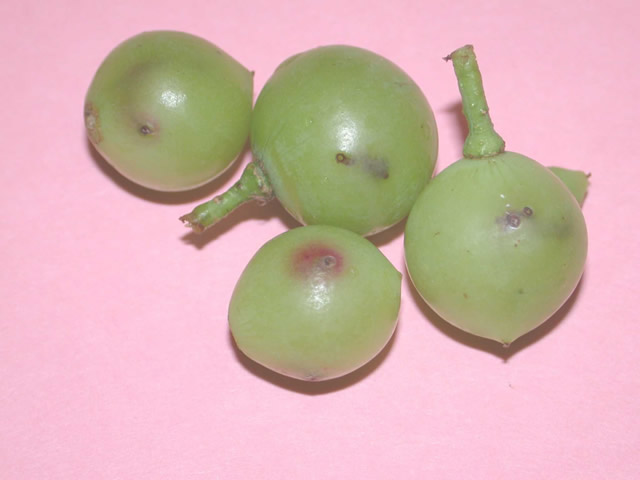
- Actually shows weekly GBM moth catch,
- Degree days (DD, base 47°F) accumulated after 1st GBM in trap in mid-April, and
- 3 predicted spray periods noted as light purple rectangles on DD line:
- The lower GBM trap catch after 26 May is attributed to insecticide sprays for:
- 1st gen. from late-May to mid-June,
- 2nd gen. from late-June to mid-July, and
- 3rd from late-July through August.
If at any time after an insecticide spray you see more than 1% of clusters with new GBM damage (> 1 damaged per
cluster), then re-apply insecticide.
Usually re-apply insecticide 10 – 14 days after initial spray for each of three generations (especially treat for 2nd and 3rd gen. that damage berries throughout vineyard).
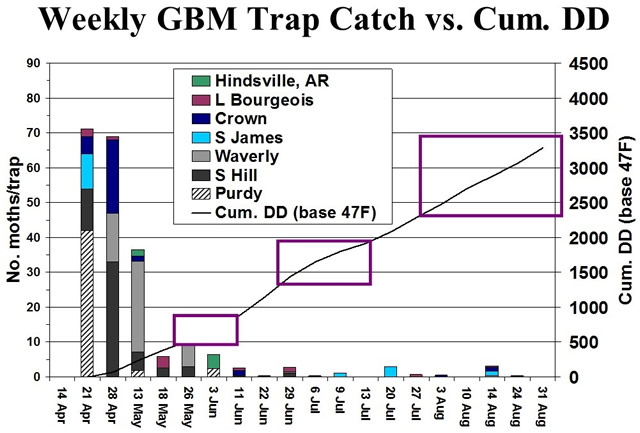
- Shows percent of GBM damaged clusters (> 1 damaged per cluster) (open diamond),
- Number of GBM larvae found (black diamond) and
- Corresponding cumulative DD period noting best to apply insecticide against 2nd gen. GBM in late-June and re-apply 10 July (during peak of larval infestation and damage).
Dr. Donn Johnson (479-575-2501; dtjohnso@uark.edu
“Growing New Roots” Vegetable Grafting Webinar Series
This webinar series was developed by the USDA-SCRI Grafting Project team, whose purpose is to help improve and maintain the competitiveness of fruiting vegetable industries in the U.S., partly by improving the science and application of vegetable grafting.
Each month a webinar will be offered, covering a different topic about the science and technology of vegetable grafting. Below is a schedule of Upcoming Webinars:
- Date: March 8, 2019
Time: 11AM-Noon (Eastern Time)
Title: Vegetable Grafting Making It Affordable and Beneficial to US Growers
Presenter:Dr. Richard Hassell, Clemson University
Please sign up using the following form:
https://goo.gl/forms/AwQTr3QgQ8XOb5Im1 (We will send a Zoom link to connect for those who sign up.) We also plan to record the webinar for those who miss this opportunity.
- Date: April 11, 2019
Time: 11AM-Noon (Eastern Time)
Title: Management of Diseases on Cucurbit Rootstock and Scion Seedlings in Greenhouse Environments
Presenter:Dr. Anthony (Tony) Keinath, Clemson University
- Date: May 14, 2019
Time: 11AM-Noon (Eastern Time)
Title: Grafting to Increase Production for Small-acreage and High Tunnel Tomato Growers
Presenter:Dr. Cary Rivard, Kansas State University
Past webinars of vegetable grafting series are also available for viewing at the USDA-SCRI Grafting Project team website, and under the “Resource” tab are listings of upcoming educational events, publications, rootstock tables, suppliers, videos and more.
Doug Gucker (217-877-6042; dgucker@illinois.edu)
Less Seriously
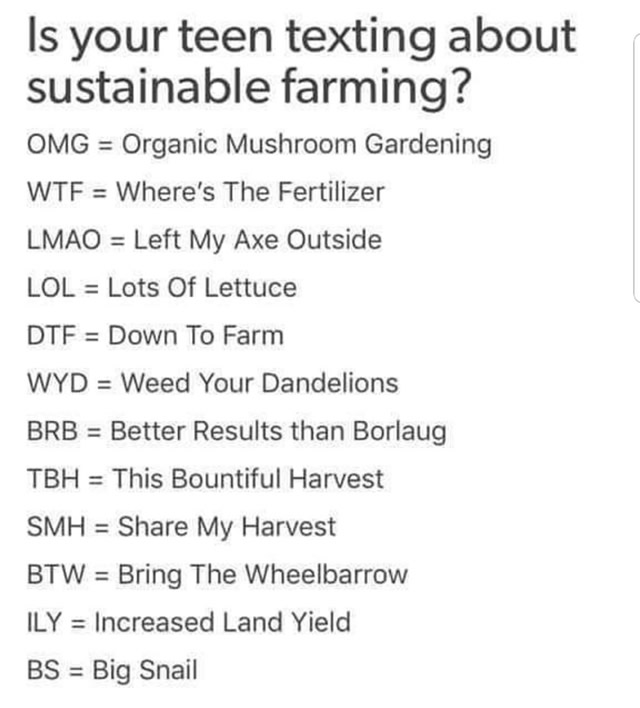
University of Illinois Extension Specialists in Fruit and Vegetable Production & Pest Management
Extension Educators – Local Food Systems and Small Farms |
||
Bronwyn Aly, Gallatin, Hamilton, Hardin, Pope, Saline, and White counties |
618-382-2662 |
|
Katie Bell, Franklin, Jackson, Perry, Randolph, & Williamson counties |
618-687-1727 |
|
Sarah Farley, Lake & McHenry counties |
847-223-8627 |
|
Nick Frillman, Woodford, Livingston, & McLean counties |
309-663-8306 |
|
Laurie George, Bond, Clinton, Jefferson, Marion, & Washington counties |
618-548-1446 |
|
Zachary Grant, Cook County | 708-679-6889 | |
Doug Gucker, DeWitt, Macon, and Piatt counties |
217-877-6042 |
|
Erin Harper, Champaign, Ford, Iroquois, and Vermillion counties |
217-333-7672 |
|
Grace Margherio, Jackie Joyner-Kersee Center, St. Clair County |
217-244-3547 |
|
Grant McCarty, Jo Daviess, Stephenson, and Winnebago counties |
815-235-4125 |
|
Katie Parker, Adams, Brown, Hancock, Pike and Schuyler counties |
217-223-8380 |
|
Kathryn Pereira, Cook County |
773-233-2900 |
|
James Theuri, Grundy, Kankakee, and Will counties |
815-933-8337 |
|
Extension Educators – Horticulture |
||
Chris Enroth, Henderson, Knox, McDonough, and Warren counties |
309-837-3939 |
|
Richard Hentschel, DuPage, Kane, and Kendall counties |
630-584-6166 |
|
Andrew Holsinger, Christian, Jersey, Macoupin, & Montgomery counties |
217-532-3941 |
|
Extension Educators - Commercial Agriculture |
||
Elizabeth Wahle, Fruit & Vegetable Production |
618-344-4230 |
|
Nathan Johanning, Madison, Monroe & St. Clair counties |
618-939-3434 |
|
Campus-based Extension Specialists |
||
Kacie Athey, Entomology |
217-244-9916 |
|
Mohammad Babadoost, Plant Pathology |
217-333-1523 |
|